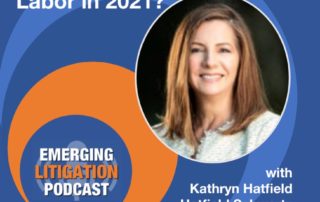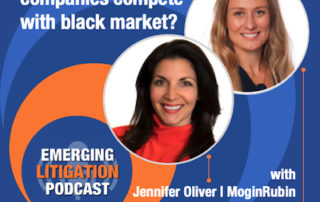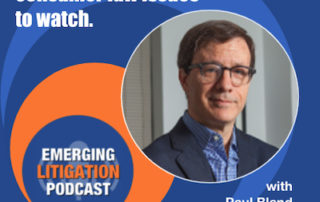Emerging Litigation Podcast
Labor Law in 2021 with Kathryn Hatfield
Labor Law in 2021 with Kathryn Hatfield Participation in labor unions is less than half of what it was 40 years ago. It has seen an uptick in the service sector, but a sharp decline in manufacturing. According to economist Heidi Shierholz decline in union rolls is partly responsible for today's yawning income inequality gap. Recently we've seen the formation of a modest union at Google and a movement among Amazon workers. We've also seen how the pandemic has shone a bright light on the fragility of our nation's workforce struggling to survive at the bottom rungs of the pay scale. Joining me to speak about these issues is Kathryn Van Deusen Hatfield, a senior managing partner at Hatfield Schwartz Law Group in New Jersey. Kathy represents private and public sector employers in all aspects of labor and employment law, with expertise in litigating state and federal cases on behalf of employers involving Title VII, the ADA, the ADEA and the New Jersey Law Against Discrimination, and providing legal opinions and advice on personnel, employment and labor issues. Kathy shares her insights on recent developments in the labor movement, some of the causes of its decline, how unions get a bad rap, and how, even though she represents management, she believes unions can be a good thing for everyone -- employees and companies alike. This podcast is the audio companion to the Journal on Emerging Issues in Litigation, a collaborative project between HB Litigation Conferences and the Fastcase legal research family, which includes Full Court Press, Law Street Media, Docket Alarm and, most recently, Judicata. If you have comments or wish to participate in one our projects, or want to tell me how insightful and informative David and Dan are, please drop me a note at Editor@LitigationConferences.com. I hope you enjoy the interview, and how I managed to demonstrate how little I [...]
Cannabis Industry Competition Law with Ausra Deluard and Jennifer Oliver
Attorneys Ausra Deluard and Jennifer Oliver on Cannabis Industry Competition Law What can legitimate cannabis companies do to level the playing field, not only against others who walk the straight and narrow, but dealers still thriving on the black market? It was my pleasure to interview Ausra Deluard and Jennifer Oliver for what was an informative and even surprising podcast. It's based on their article -- Clearing the Haze: State Laws and Private Plaintiffs Critical to Preserve Competition in Cannabis -- which will be featured in the inaugural issue of the Journal on Emerging Issues in Litigation, which will release in January 2021. Ausra, who is an attorney with the global law firm Dentons LLP, has spent more than a decade advising clients in a range of antitrust matters including merger investigations, competitor collaborations, and pricing and distribution policies. She works closely with cannabis clients to help them navigate the rapidly evolving cannabis laws and regulations throughout the U.S. Jennifer is a partner at national antitrust boutique MoginRubin LLP, where she litigates and advises clients on competition issues. Her work includes representing classes of plaintiffs in class actions, risk mitigation and regulatory advice in mergers and acquisitions, and other complex business litigation. Check out the MoginRubin Blog. The Journal is a collaborative project between HB and the Fastcase legal research family, which includes Full Court Press, Law Street Media, Docket Alarm and, most recently, Judicata. If you have comments or wish to participate in one our projects, or want to tell me how awesome Ausra and Jennifer are, drop me a note at Question@LitigationConferences.com. We hope you enjoy the interview. Tom Hagy Founder & Managing Director HB Litigation Conferences
Three Urgent Consumer Class Action Topics with Paul Bland of Public Justice
Three Urgent Consumer Class Action Topics with Paul Bland of Public Justice To discuss these issues, it was my pleasure to interview F. Paul Bland, Jr., Executive Director of Public Justice, an organization that pursues "high impact lawsuits to combat social and economic injustice, protect the Earth’s sustainability, and challenge predatory corporate conduct and government abuses." Paul has argued and won more than 40 cases that led to reported decisions for consumers, employees or whistleblowers, including one victory in the U.S. Supreme Court, and has won one or more cases in six of the U.S. Courts of Appeals and the high courts of 10 different states. This podcast is the audio companion to the Journal on Emerging Issues in Litigation, a collaborative project between HB and the Fastcase legal research family, which includes Full Court Press, Law Street Media, Docket Alarm and, most recently, Judicata. If you have comments or wish to participate in one our projects, or want to tell me how insightful and informative Paul is, please drop me a note at Editor@LitigationConferences.com. We hope you enjoy the interview, and how I slipped in mention of Schrödinger's cat which, as everyone knows (that's sarcasm and self-deprecation), is a thought experiment that illustrates an apparent paradox of quantum superposition. Class actions can be an invaluable tool when consumers need to level the playing field in disputes with corporations. Two important class action cases are currently before the Supreme Court. One case, TransUnion v. Ramirez, involves innocent consumers who were erroneously added to the government's watch list for terrorists and drug smugglers. [Note: We recorded before the Supreme Court handed down its ruling that only plaintiffs concretely harmed by a defendant’s statutory violation have Article III standing to seek damages against that private defendant in federal court.] In the second, Goldman Sachs v. Arkansas Teachers, consumers seek to fend off a decision that could limit securities [...]
A Shameless Plug for Our Content Services
Your content marketing is everything you’ve ever dreamed of. Right?

Critical Legal Content was founded by Tom Hagy, former Editor & Publisher of Mealey’s Litigation Reports and VP at LexisNexis, founder of HB, current litigation podcaster and editor-in-chief. CLC’s mission is to help smaller firms and service providers not only create content — blogs, articles, papers, webinars, podcasts (like the stuff on this site) — but also to get it out there. How? Via social media, this website, your website, and potential via our podcast and journal which we publish in collaboration with vLex Fastcase and Law Street Media. The goal is to attract readers and dizzy them with your brilliance.
*Inspired by actual events.
Create content like a real legal publisher.













